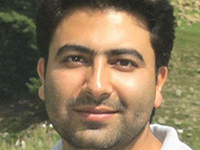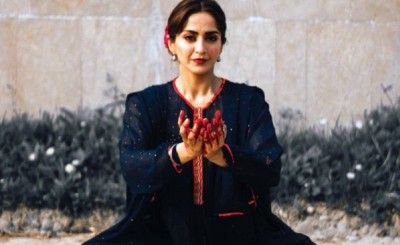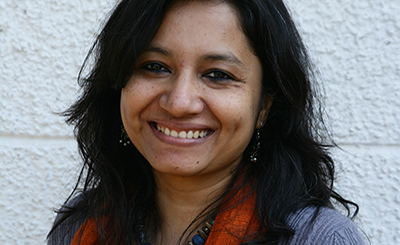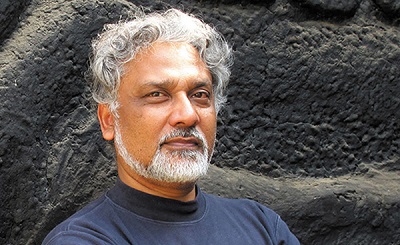
The human mind cannot be absolutely destroyed with the body, but something of it remains which is eternal.
—Spinoza
An image of scented smoke — gentle and sensual wisps, hung in air — looks like the image of bones in an X-ray film. The fair ladies in brocaded, laced, silver-frilled, white cambric dresses are so beautifully delicate that if touched hard they could metamorphose into a clean water, then scatter and vanish. Their seraphic eyes are large, and their faces change with each stylistic turn of their heads, that, a moment later Muhammad Ameen cannot tell who was who. There is an abstract painting on the golden wall — studded with diamonds and precious stones — in which two lovers seem kissing each other but actually aren’t. On a close look it turns out to be a painting of an abstract goblet. Everything inside and outside is so perfect and absolute that he is painfully confused.
Ameen has found all the scriptural promises true and fulfilled. Here he is again a thirty-year-old youthful, sturdy Ameen and not the man who was touched by a bullet at forty-two. He no longer stammers, all the impediments from his tongue have been removed. And he doesn’t care whether he makes sense or not. He is surrounded by the promised streams of milk and honey, large-eyed houris, like scattered pearls around him, and trees, heavily laden with fruits of large sizes, far-reaching scents and brash colours, and pretty birds perched on their branches, warbling sweet birdsong into the dense foliage — all that he had repeatedly heard of in his Qur’an lessons and Friday sermons in the worldly life. He now lives in a spacious, palatial house. He lies down on velvety divans against soft, satin-cased bolsters. There is hardly a moment he feels alone but slowly all these absolute pleasures are becoming a routine affair and beginning to bore him. Of course he has already had answers to his countless complicated questions he had always suffered thinking about, and had ever waited and wanted to ask. Those questions have been answered in a language he could not have even wished to speak in his worldly life; but above all he has understood the answers well and has been convinced. Ameen has met many of his relatives and friends and acquaintances who have reached here before him. He is surprised to see many of those who he or even any well-meaning person in the world had never ever, by any means, expected to make it to the heaven. Yet they have. He is more surprised at not finding those who everyone, almost all the well-meaning persons in the world, had bet that they belonged to heaven. They have all died in the world but are absent here. Without problems and with everything perfect and absolute and gratifying around him, Ameen believes that there still is but one major problem in the heaven. And it is that here there is no place for problems but he has the same mind to think.
~
In his worldly life, Muhammad Ameen exhaustively thought about identity confrontations, race combats, communal clashes, civilisational conflicts, power tussles, oil wars and what not. He would ponder and ponder over great existential and moral questions, the questions about good and bad and their origins and ultimate purposes. Ameen was a self-styled student of philosophy. Self-styled, because each university in Kashmir had everything except a faculty of philosophy where he could have pursued the subject on post-graduation level and even beyond. He had studied the subject from his higher secondary level towards the end of his college, had been guided by mediocre teachers who knew nothing about philosophy and consequently learnt by teaching himself and from occasional parleys with his jobless, wise friends who were much elder to him.
His parents were peasants and couldn’t afford a private English-medium school for him and for his three elder brothers and two younger sisters. Like his siblings, he had his primary education in an Urdu-medium government school at Natipora. In a way Ameen was split in his day-to-day social dealings: humble to humble, aggressive to mediocre, a lover and yet a pleasant liar to his wife, a loving, caring, nagging and beating father to his two sons, a brusque and argumentative yet a very obedient son. He felt shy of confessing his love to his parents and brothers and sisters. For he had been brought up like that. He had experienced elsewhere that many who confessed love more and more fondly loved less and less practically. It’d make the whole affair of love more verbal and less actual.
Instead he would say things, which were opposites to those confessions. But the knowledge of any harm to his relatives would send his bowels rumbling with worry and fear. Once a doctor misdiagnosed his eldest brother with “ulceration in the stomach”, which was actually a minor case of acid reflux, Ameen got more sickened than his brother. His brother recuperated but himself, Ameen dehydrated in depression. Once in a dream he saw his mother dying and then that whole day, after waking up from the dream, he furtively cried in the attic. In soliloquy he told himself he could not live without her and for that matter if he had to die he should die before her. In his high school days Ameen read about Socrates, Plato and Aristotle. He developed an interest in philosophy and it only grew and grew. Later he would study all the great minds he came across, borrowing their books from his friends and libraries, and sometimes not returning: Spinoza’s conceptions of self and universe; his ethics, Hegel’s absolute reality, Nietzsche’s perspectivism and will to power, Kant’s reason and human experience, Schopenhauer’s will, Rousseau’s social contract, Marx’s study of labour and capital, Russell’s analytic philosophy, Heidegger’s philosophical hermeneutics, Ibn-e-Arabi’s unity of being, Shariati’s sociology of religion; he studied Muthari, Ghazaali, Afghani, Iqbal and many more, he also indulged in the works of great litterateurs like Dostoevsky, Tolstoy, Chekhov, Proust, Joyce, Saramago, Mahfouz, Naipaul, Camus, Ghalib, Faiz and a constellation of others. He learnt that Louis Althusser, a German philosopher, often lost in stupor of thought, once while massaging his wife’s neck unknowingly strangled her to death and later the court too acquitted him for her murder, accepting that the philosopher had done so unintentionally in a certain mental condition. Ameen disliked such extremities. He also despised the fact that Saul Bellow would be so absorbed in his literary work that his wife and their son had to seek his appointments to see him. But still, despite hating such extremities, himself, Ameen easily tended to give into them.
Page
Donate Now
More from The Byword
Comments
*Comments will be moderated











